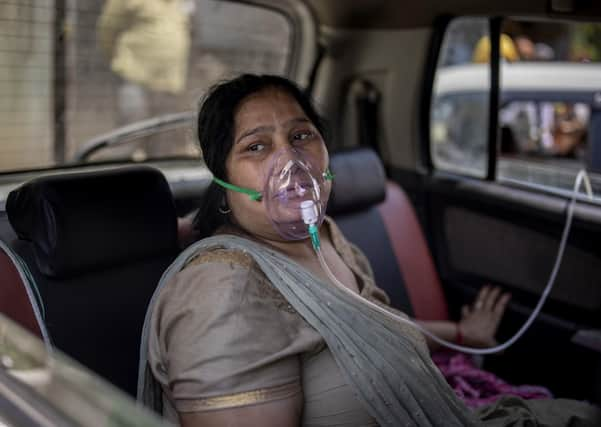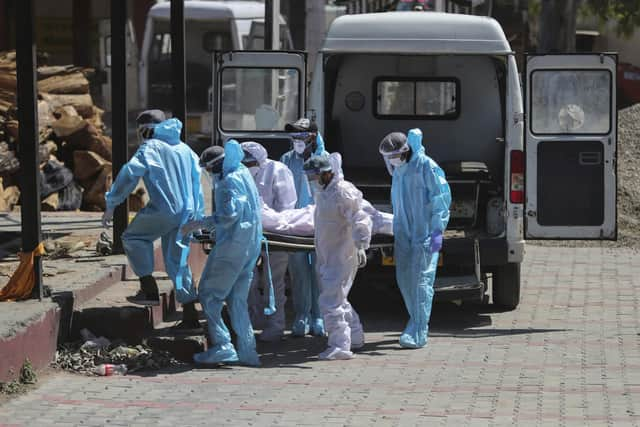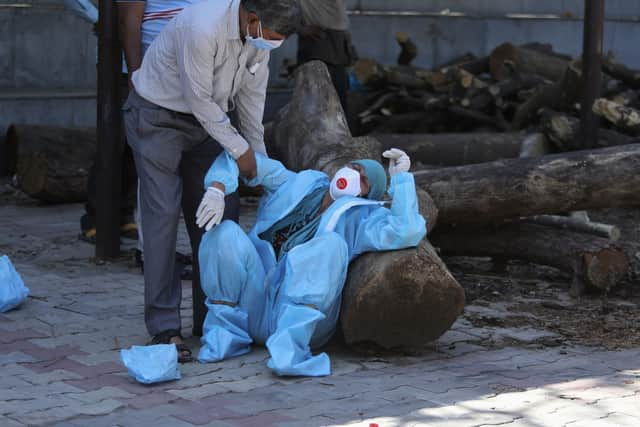India’s pandemic crisis: ‘None of us are safe until we all are’ – Bill Carmichael


Meanwhile the smoke rises from the funeral pyres set alight in car parks to dispose of the corpses of those who have died.
It sounds like an apocalyptic movie script, but this is the real world, right now, in India the world’s most populous democracy and a great friend and important business partner of the UK.
Advertisement
Hide AdAdvertisement
Hide AdThe heart-breaking scenes are being played out across the vast country with a population of more than 1.3 billion, as what doctors have called a “tsunami” second wave of the Covid-19 pandemic takes hold.


Infection and death rates are rising rapidly, but even then are believed to be vastly under-reported because of the lack of up-to-date figures from smaller towns and rural areas.
Watching the terrible footage on TV, I couldn’t help thinking that it could have happened here. Remember just over a year ago the repeated blood chilling warnings that our own health service could be overwhelmed if the pandemic took hold.
Perhaps without the lockdowns and the vaccine rollout we could have been in the same boat as India?
Advertisement
Hide AdAdvertisement
Hide AdIt isn’t entirely clear why India has been so badly hit, but fingers of blame are being pointed at the decision to ease restrictions and allow large election rallies and religious gatherings and the reopening of most public spaces.


And despite its recent rapid economic growth, India is still a developing country with much poverty, poor housing and overcrowding, which may have played a part.
Either way, it is clear that India needs all the help the international community can provide. One reason of course is simple compassion for the suffering of a great ally with strong historical and cultural connections to the UK, and with many people of Indian origin settling here and making valued contributions to our national life.
But what is happening in India matters to the rest of the world for another reason. When the pandemic lets rip, as appears to be happening in India, the chances of a vaccine-resistant strain developing are increased.
Advertisement
Hide AdAdvertisement
Hide AdLast month scientists in India identified the so-called “double mutant” strain of the virus that is believed to have made it much more infectious. Tests are continuing to discover if the vaccines still work against this strain.
And in an interconnected world if a vaccine-resistant strain does develop you can bet your life it will spread around the globe, regardless of travel restrictions, Covid passports and quarantine regulations.
In other words all the good work the UK has achieved in recent months in combatting the virus could all be undone in a few weeks and we will be back where we started. As Dr Soumya Swaminathan, the Indian-born World Health Organisation’s chief scientist, said: “The virus doesn’t respect borders, or nationalities, or age, or sex or religion.”
That’s why the petty nationalism of the European Union, which has threatened to block exports of the vaccine, and the anti-vax scaremongering of many European leaders, is so dangerously stupid and irresponsible. The EU’s Commissioners need to get it into their thick skulls that none of us are safe until we all are safe.
Advertisement
Hide AdAdvertisement
Hide AdSo, rather than blocking exports of the vaccine, we should be doing everything in our power to send as many doses as possible around the world, particularly to poorer nations.
The UK has already donated more than £500m to the international Covax scheme, which aims to send more than two billion doses of vaccine to 190 countries in less than a year. Already, 38 million doses have been delivered to 98 countries.
The Oxford-AstraZeneca vaccine is especially important as it represents more than 90 per cent of the vaccines distributed through Covax and is being produced at cost, making it far cheaper than most other vaccines.
So some good progress has been made, but given what is happening in India, and which could be repeated in other developing countries, we have to ask, is it enough?
Advertisement
Hide AdAdvertisement
Hide AdThis is a global crisis that threatens every one of us. The international community needs to come together to defeat this horrible virus once and for all.
Support The Yorkshire Post and become a subscriber today. Your subscription will help us to continue to bring quality news to the people of Yorkshire. In return, you’ll see fewer ads on site, get free access to our app and receive exclusive members-only offers. Click here to subscribe.
Comment Guidelines
National World encourages reader discussion on our stories. User feedback, insights and back-and-forth exchanges add a rich layer of context to reporting. Please review our Community Guidelines before commenting.